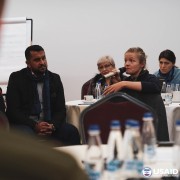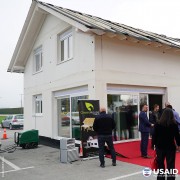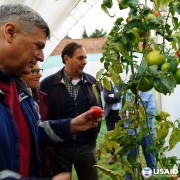Speeches Shim

On January 23, 2020, USAID/Kosovo organized a half-day workshop with local organizations, institutions, donors, and local collectors of recycling materials to discuss the challenges of recycling and the opportunities for social cohesion. Conversations revolved around the health risks, the lack of dialogue with local municipalities, and the need to protect the environment.

As Kosovo’s private sector was getting a boost from government reforms fostering a more transparent and predictable business-enabling environment, USAID EMPOWER’s approach to strengthening the private sector led to an additional 5,000 jobs in Kosovo. A skilled workforce is at the core of a strong private sector in any given country, Kosovo included.

A business-to-business meeting resulted in 92 contracts signed between Kosovo-Serb farmers in the North and Kosovo-Albanian buyers (businesses). The exchange totaled more than €150,000 for the production and respective purchase of vegetables and medicinal herbs. This success is a result of USAID’s strategic efforts to improve opportunities for the economic prosperity of businesses in the northern part of Kosovo, initially through the provision of small greenhouses followed by producer-buyer linkages.

At the time of USAID’s initial investments in Kosovo, raspberries were an obscure crop. Fast forward to the end of 2019, and raspberries have become a massive export industry for Kosovo—earning almost $25 million to date. Farmers in Kosovo are earning as much as 10 times more for farming raspberries, compared to the traditional wheat crop; and young people are choosing farming as a career option. With more than 3,000 farmers reaping the benefits of growing raspberries, no other sector is generating and sustaining this level of employment in Kosovo.

Local civil society organizations, equipped with tools learned through a USAID-funded program, conducted independent monitoring of a recent municipal procurement to construct a school sports hall in the village of Gacke, Ferizaj, shedding light on many irregularities. The monitoring helped raise awareness and identify lessons learned for more effective procurement in the future. While many local civil society organizations are not able to carry out thorough procurement monitoring due to a lack of skills, capacities, and funding.

Comment
Make a general inquiry or suggest an improvement.